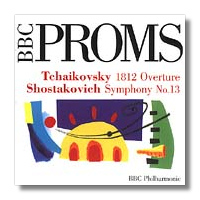
The Internet's Premier Classical Music Source
Related Links
- Latest Reviews
- More Reviews
-
By Composer
-
Collections
DVD & Blu-ray
Books
Concert Reviews
Articles/Interviews
Software
Audio
Search Amazon
Recommended Links
Site News
 CD Review
CD Review
BBC Proms

- Piotr Ilyitch Tchaikovsky: 1812 Overture
- Dmitri Shostakovich: Symphony #13 "Babi Yar"
Sergei Leiferkus, baritone
Leeds Festival Chorus
Huddersfield Choral Society
BBC Philharmonic Orchestra/Vassily Sinaisky
BBC Music BBCP1002-2 DDD 70:52
Nicholas Kenyon, Director of the BBC Proms, introduces this live CD in his booklet note as "a permanent memento of great evenings at the Proms, and as an introduction to the best of classical music." It would seem that this disc is intended for the new collector. He or she certainly might want a version of the 1812 Overture. Shostakovich's Thirteenth Symphony is a more adventurous choice, and how curious it is, given the assumed audience, that the booklet contains neither Russian texts nor translations, nor even an indication as to what the soloist and the men's chorus are singing about. I can't recommend this recording to newcomers, then, but I can recommend it to those who are fascinated by Shostakovich's work. The recording was made in Royal Albert Hall on August 21, 1998 with an audience that is appreciative at the end of the works but quiet elsewhere.
The Tchaikovsky comes first. I wonder if it did in concert, because how can one surpass cannon shots in Royal Albert Hall? (I assume that these were pre-recorded. Nevertheless, they pack a punch.) Sinaisky is insinuating and sensitive in the music's quieter sections and freewheeling at the climaxes. It's an effective enough reading. The Shostakovich gets off to an equivocal start with the men's chorus, which is rather recessed, particularly in relation to Leiferkus. Actually, it's probably a realistic picture of what the audience heard, but it's not necessarily what someone at home will want to hear repeatedly. Leiferkus, a true baritone, compensates for a lack of timbral weight through his expressivity. A darker voice would have worked better in the first and third movements. Still, Leiferkus's attractive sound has merits of its own. A more forwardly placed chorus would have sounded more positive. The great English choral tradition is not advanced here. As for Sinaisky's conducting, it eschews the music's granitic qualities in favor of watercolor shadings. Relatively brisk tempos aren't as problematic as a fussy tendency to nudge the music forward from time to time. One positive point of Sinaisky's conducting is the loving way in which instrumental solos are treated. Try the woodwinds at the start of "A Career" and you'll hear some sensitive orchestral playing.
With many excellent Shostakovich Thirteenths available, it's hard to recommend this one as a first choice. It's not just a pallid echo of other recordings, however, and so admirers of this symphony might want to check it out for its unique insights.
Copyright © 2000, Raymond Tuttle


















